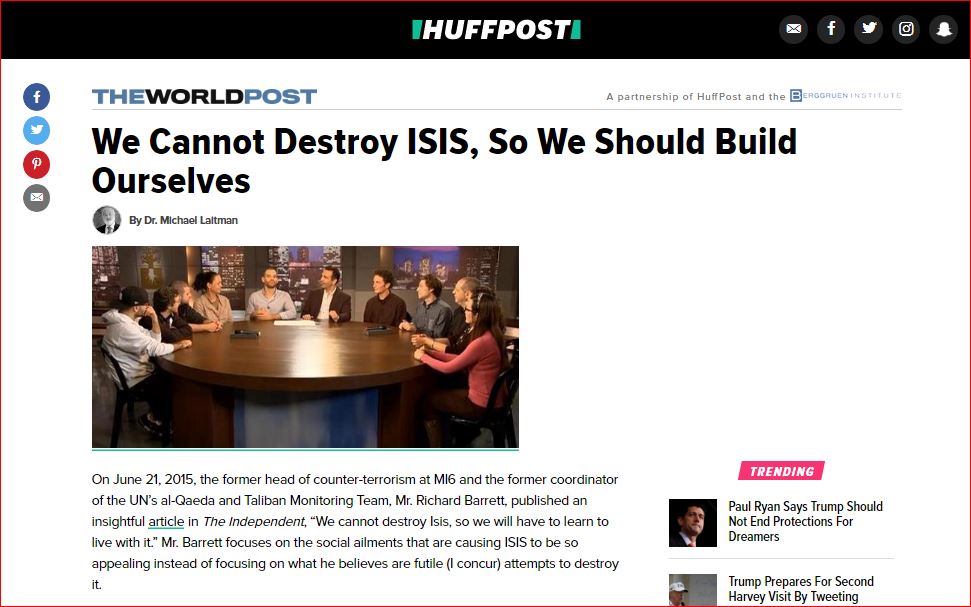
On June 21, 2015, the former head of counter-terrorism at MI6 and the former coordinator of the UN’s al-Qaeda and Taliban Monitoring Team, Mr. Richard Barrett, published an insightful article in The Independent, “We cannot destroy Isis, so we will have to learn to live with it.” Mr. Barrett focuses on the social ailments that are causing ISIS to be so appealing instead of focusing on what he believes are futile (I concur) attempts to destroy it.
Barrett agrees with British Prime Minister David Cameron about “the responsibility that families and communities [have] to detect and counter the radicalisation of young people by the so-called Islamic State (Isis).” However, Barrett points out that ISIS is not the problem. He says that this responsibility is no different from the “responsibility that they have to deter their younger members from joining anti-social gangs or falling into the clutches of cults that offer similar attractions of identity and belonging.”
Mr. Barrett also writes that ISIS projects a strong identity and sense of purpose, and it appeals in particular to people who lack both; it offers them the opportunity to be part of something new, regardless of their gender or abilities. “It is a sad comment on our own society,” he continues, “that a limited but significant number of young people … cannot readily identify a better outlet for their energies and aspirations at home.”
Indeed, the crux of the matter is that today’s youngsters have neither identity nor belonging. This is what all of us, all over the Western world, should focus on, because the problem is not endemic to the UK but manifests globally.
I have nothing against technology or progress. But when the two replace human connection, we are in big trouble. Humans are social beings and therefore cannot satisfy their social needs through social networks. We all need physical contact, emotional engagement, and mutual commitment in order to feel safe and content. Ironically, safety is precisely what this fundamentalist organization is providing our young. With the added sense of belonging and purpose, ISIS’s appeal becomes irresistible to many Western youngsters, many of whom have neither safety nor purpose, and certainly not a sense of belonging.
The narcissism and ruthless competition that dominate our postmodern world must be replaced by a social paradigm of mutual responsibility where we start looking out for one another. The government cannot build it for us; it is our job as citizens to determine our priorities and begin to live out a different day-to-day scenario. We must all do our part to make our world safe.
In my lectures around the world, I try to push this notion forward. I have established organizations that promote mutual responsibility both independently and in collaboration with other NGOs. The ARI Institute, which I founded, has collaborated on this matter with the UN, UNESCO, the GOI Peace Foundation, the Club of Budapest, and many other organizations and socially aware individuals. Currently, a team of dedicated members of the ARI is working on a site that will help people from around the world connect in new ways, above differences, and above egos.
I can testify from personal experience that people agree that the heart of the Western world’s problems is social alienation. But I can also testify to the hesitance that most of us feel when called upon to act. I think we have waited very long. I hope we have not waited too long.
We do need to take action against those who wish to kill us and destroy humanity. But we need to take even swifter action in favor of our fellow human beings around the world who are seeking true friendship, mutual responsibility, and a sense of belonging. Only when humanity lives out the oneness that it comprises will it be happy and prosperous.
Featured in Huffington Post